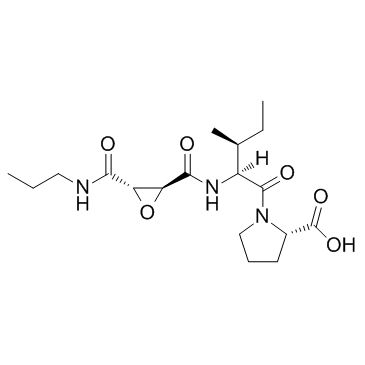All AbMole products are for research use only, cannot be used for human consumption.

In vitro: CA-074 is a synthetic analogue of E-64, a natural peptidyl epoxide that irreversibly inhibits most known lysosomal cysteine proteinases, and is developed by means of rational drug design, exploiting the dipeptidylcarboxypeptidase activity of cathepsin B. CA-074 can be used to selectively inhibit cathepsin B within living cells, as long as the experimental conditions permit significant fluid-phase endocytosis of the drug. CA-074 inhibits cathepsin B with a Ki of 2 to 5 nM, whereas the initial Kis for cathepsin H and L are about 40-200 μM. CA-074 exhibits 10000-30000 times greater inhibitory effects on purified rat cathepsin B than on cathepsin H and L.
In vivo: Intraperitoneally injection of compound CA-074 into rats potently and selectively inhibits cathepsin B activity. Intravenously administration of CA-074 immediately after the ischaemic insult saves 67% of CA1 neurons from delayed neuronal death on day 5 in eight monkeys undergoing 20 min brain ischaemia: the extent of inhibition is excellent in three of eight and good in five of eight monkeys.
| Cell Experiment | |
|---|---|
| Cell lines | |
| Preparation method | |
| Concentrations | |
| Incubation time | |
| Animal Experiment | |
|---|---|
| Animal models | Rats |
| Formulation | saline containing DMSO |
| Dosages | 8 mg/100 g body weight |
| Administration | i.p. |
| Molecular Weight | 383.44 |
| Formula | C18H29N3O6 |
| CAS Number | 134448-10-5 |
| Solubility (25°C) | 150 mg/mL in DMSO |
| Storage |
Powder -20°C 3 years ; 4°C 2 years In solvent -80°C 6 months ; -20°C 1 month |
| Related Caspase Products |
|---|
| Z-VAD
Z-VAD is a competitive, irreversible pan-caspase inhibitor. Z-VAD inhibits all 10 caspases, except for caspase-2 which is only weakly inhibited. Z-VAD decreases radiation-induced apoptosis. |
| PEAQX
PEAQX (NVP-AAM077) is an orally active and selective NMDA antagonist, with IC50 values of 270 nM and 29.6 μM for hNMDAR 1A/2A and hNMDAR 1A/2B, respectively. |
| MMPSI
MMPSI is a potent and selective small molecule caspase 3 and caspase 7 inhibitor with an IC50 of 1.7 μM for human caspase-3. |
| Ivachtin
Ivachtin (Caspase-3 Inhibitor VII; compound 7a) is a nonpeptide, noncompetitive and reversibl caspase-3 inhibitor with an IC50 of 23 nM. |
| VMY-1-103
VMY-1-103 is an inhibitor for cyclin/Cdk complex, that arrests the cell cycle at G1 phase. |
All AbMole products are for research use only, cannot be used for human consumption or veterinary use. We do not provide products or services to individuals. Please comply with the intended use and do not use AbMole products for any other purpose.


Products are for research use only. Not for human use. We do not sell to patients.
© Copyright 2010-2024 AbMole BioScience. All Rights Reserved.
